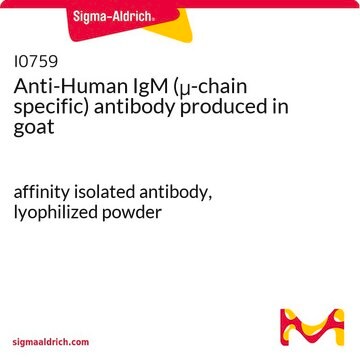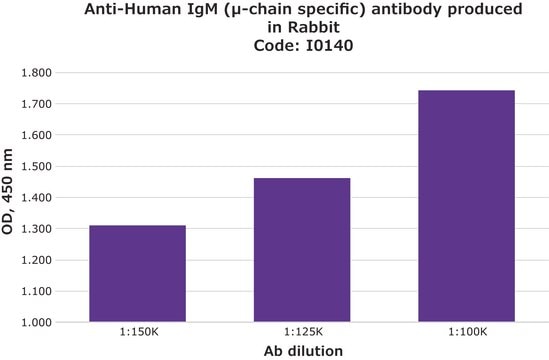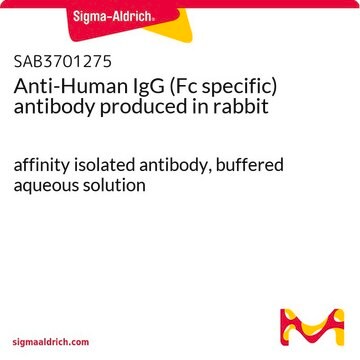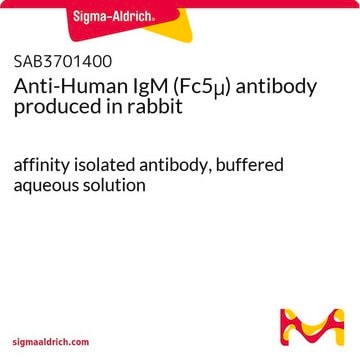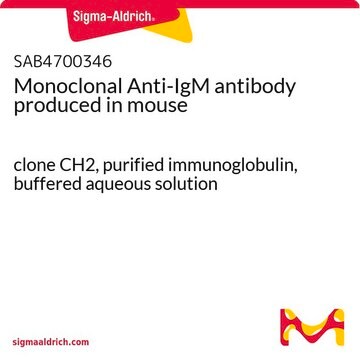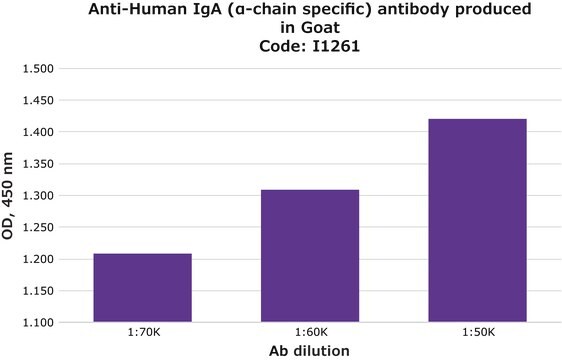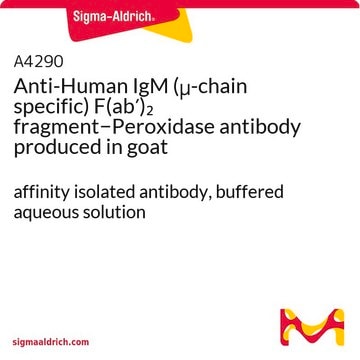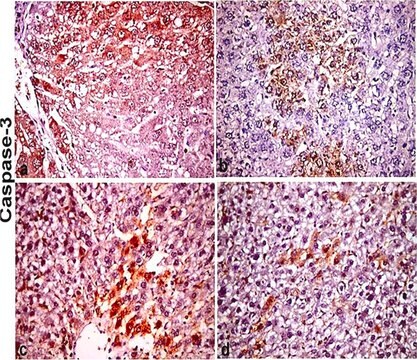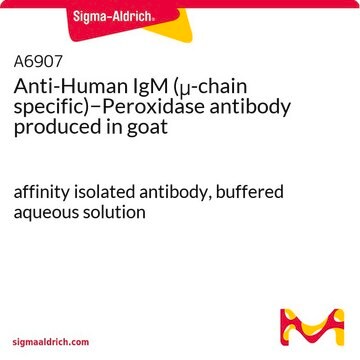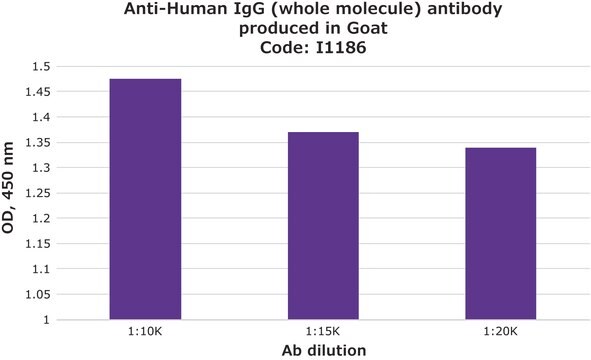I1636
Anti-Human IgM (μ-chain specific) antibody produced in goat
whole antiserum
Sign Into View Organizational & Contract Pricing
All Photos(1)
About This Item
Recommended Products
biological source
goat
Quality Level
conjugate
unconjugated
antibody form
whole antiserum
antibody product type
secondary antibodies
clone
polyclonal
contains
15 mM sodium azide
technique(s)
indirect ELISA: 1:100,000
shipped in
dry ice
storage temp.
−20°C
target post-translational modification
unmodified
Looking for similar products? Visit Product Comparison Guide
General description
Immunoglobulin M (IgM) is the major component of antibodies. It is the first antibody to be secreted during a primary antibody response, which is expressed in the human fetus. IgM is produced by B1 cells, which is found in blood.
Specificity
The antibody preparation is specific for human IgM when tested against purified human IgA, IgG, Bence Jones Kappa and Bence Jones Lambda light chains
Biochem/physiol Actions
IgM antibodies are present as pentamers in the serum and are produced in response to antigens.
Immunoglobulin M (IgM) pentamer activates the classical pathway of complement activation and lysis of red blood cells. Monoclonal IgM antibodies provides protection against systemic infection and autoimmune diseases. It does not cross human placenta. IgM regulates B cell development.
Physical form
Supplied as a liquid containing 15 mM sodium azide as a preservative.
Storage and Stability
For continuous use, store at 2-8 °C for up to one month. For extended storage, the solution may be frozen in working aliquots. Repeated freezing and thawing is not recommended. Storage in "frost-free" freezers not recommended. If slight turbidity occurs upon prolonged storage, clarify the solution by centrifugation before use.
Disclaimer
Unless otherwise stated in our catalog or other company documentation accompanying the product(s), our products are intended for research use only and are not to be used for any other purpose, which includes but is not limited to, unauthorized commercial uses, in vitro diagnostic uses, ex vivo or in vivo therapeutic uses or any type of consumption or application to humans or animals.
Not finding the right product?
Try our Product Selector Tool.
Storage Class Code
12 - Non Combustible Liquids
WGK
nwg
Flash Point(F)
Not applicable
Flash Point(C)
Not applicable
Choose from one of the most recent versions:
Certificates of Analysis (COA)
Lot/Batch Number
Don't see the Right Version?
If you require a particular version, you can look up a specific certificate by the Lot or Batch number.
Already Own This Product?
Find documentation for the products that you have recently purchased in the Document Library.
Customers Also Viewed
Sherif Bayoumy et al.
Scientific reports, 11(1), 18698-18698 (2021-09-23)
Measurement of cardiac troponin I (cTnI) should be feasible for point-of-care testing (POCT) to diagnose acute myocardial infarction (AMI). Lateral flow immunoassays (LFIAs) have been long implemented in POCT and clinical settings. However, sensitivity, matrix effect and quantitation in lateral
Role of natural and immune IgM antibodies in immune responses
Boes M, et al.
Molecular Immunology, 37(18), 1141-1149 (2000)
The immunological development of the human fetus
Van FR, et al.
The Journal of Experimental Medicine, 122(6), 1173-1188 (1965)
José de la Fuente et al.
F1000Research, 9, 1366-1366 (2021-08-21)
Humans evolved by losing the capacity to synthesize the glycan Galα1-3Galβ1-(3)4GlcNAc-R (α-Gal), which resulted in the development of a protective response mediated by anti-α-Gal IgM/IgG/IgA antibodies against pathogens containing this modification on membrane proteins. As an evolutionary trade-off, humans can develop
The importance of natural IgM: scavenger, protector and regulator
Ehrenstein MR and Notley, Clare A
Nature Reviews: Immunology, 10(11), 778-778 (2010)
Our team of scientists has experience in all areas of research including Life Science, Material Science, Chemical Synthesis, Chromatography, Analytical and many others.
Contact Technical Service